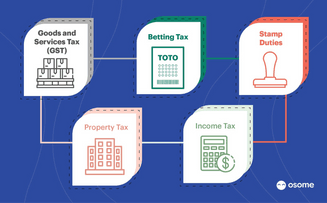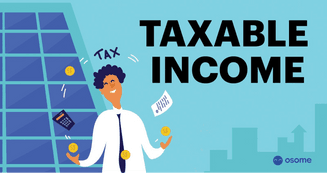- Osome Blog SG
- Singapore Tax System Guide: Types & Rates
Singapore Tax System Guide: Types & Rates
- Modified: 3 April 2025
- 3 min read
- Accounting & Bookkeeping, Taxes & Compliance


Nataliya Dzhariani
Author
Nataliya is a branding and marketing manager and an enthusiastic amateur interior designer. She has expanded companies in New York, Moscow, London, and Paris, gaining extensive international experience. Nataliya combines creative thinking with strategic expertise to provide Singapore readers with practical and inspiring insights on branding, marketing, and business expansion.

Imran Marican
Reviewer
Imran Marican, ATA SCTP member, is our Corporate Tax Assistant Manager based in Singapore, with almost a decade of experience in Singapore corporate tax. With in-depth knowledge of Singapore corporate tax law and regulations, he can help with corporate tax compliance that matters to every company. While our business writers transform complicated tax jargon into easy-to-understand concepts, as a reviewer for the Osome blog, Imran ensures our content is accurate and relevant, helping our readers boost their businesses with helpful tips and insights.

Kelly Yik
Reviewer
Kelly Yik, our Accounting Team Lead based in Singapore, ensures that the team meets quality standards and follows accounting standards (SFRS) while remaining compliant with all the authorities' rules and regulations in Singapore. With six years of experience in Singapore accounting, she knows the ins and outs of financial reporting standards, GST, and corporate tax like nobody's business. Kelly supports our blog writers by carefully reviewing our content, making sure it's accurate, up-to-date, and packed with helpful tips for Singapore businesses. So, you can trust the info you get on our blog is not only interesting but also reliable!

Rasool Beevi
Reviewer
Rasool Beevi, our Assistant Accounting Operations Manager, plays a key role in maintaining seamless financial operations. With in-depth expertise in accounting processes and compliance, she ensures accuracy and efficiency in financial reporting. While our business writers simplify complex accounting topics, Rasool reviews our content to ensure it remains precise, practical, and valuable for business owners looking to manage their finances effectively.
Other than low tax rates and tax incentives for foreign investors, the friendly Singapore tax system has turned the country into a preferred destination for starting a business.
The tax regime of Singapore is already well-known among the business communities across the world for its easy-on-pocket personal and corporate tax rates, tax benefits, and tax relief measures, and the absence of capital gains tax.
Key Takeaways
- Singapore offers competitive income tax rates, with corporate tax capped at 17% and personal income tax reaching a maximum of 24%. These rates, combined with various tax incentives, help attract foreign investors and foster economic growth.
- The lack of a capital gains tax in Singapore provides a significant advantage for investors and businesses, allowing them to retain more of their profits.
- The single-tier tax system ensures that tax is levied only at the corporate level, with dividends distributed by Singapore tax resident companies being tax-free for shareholders.
Features of Singapore's Taxation System
Here are the major components of the Singapore taxation system:
Low tax rates
Singapore's income tax rates are relatively low. The highest corporate tax rate in the country is a flat 17 percent. Also, the highest personal tax rate is 24 percent. There are various tax benefits available to lower the effective tax rates.
No capital gains tax
Another major highlight of Singapore’s taxation system is that the country does not impose any tax on capital gains, income generated from foreign sources, and dividends. However, this tax exemption is subject to approval by IRAS. Foreign-sourced income, which includes branch profits, dividends, and service income, is taxed upon being remitted into Singapore, with potential exemptions available if certain conditions regarding taxation in the source country are met. Also, there is no tax on acquiring assets as gifts or inheritance.
Single-tier tax
Under the single-tier tax system, taxation on profits occurs at the corporate level, and this is the only tax that payees will incur on such earnings. Dividend payments are exempt from tax, provided the distributing company is a Singapore tax resident.
No double taxation
There are extensive treaties for avoiding double taxation in place, which means individuals and companies who receive income and assets from overseas pay tax only once. Resident companies can claim tax relief on foreign income earned from treaty countries by providing a Certificate of Residence.
Despite having low income tax rates for individuals and businesses, Singapore consistently generates significant budget surpluses while developing world-class infrastructure in the country. Many countries have set the economy of Singapore as their benchmark and are trying to catch up.
Types of Taxes in Singapore
Singapore’s tax revenue collection consists of corporate tax, personal tax, Goods & Services tax, and property tax. Simple, attractive, and efficient – this is how we can describe Singapore’s tax system.

Here are the types of taxes in Singapore:
- Income Tax: This encompasses two main categories – personal tax and corporate tax. Personal tax is levied on individual earnings, while corporate tax is imposed on the net income of companies. Both categories have specific rates and incentives that aim to attract foreign investors and support business growth.
- Property Tax: This is a type of tax for property owners based on the estimated rental values of their properties.
- Goods & Services Tax (GST): The government imposes GST on the consumption of goods and services. The tax is chargeable when people and companies spend money on goods or services, including imports. This type of indirect tax is also called “Value Added Tax (VAT)” in different countries.
- Customs and Excise Duties: Singapore has only a few customs and excise duties. The country imposes excise duties mainly on items such as petroleum products, tobacco, and liquors. Also, there are very few items on which import duties are payable. These duties are payable mainly on motor vehicles, liquor, tobacco, and petroleum products.
- Estate Duty: Not in effect anymore. It was withdrawn on February 15, 2008.
- Stamp Duty: The stamp duty is for legal and commercial and legal documents regarding immovable properties and stock & shares.
- Vehicle Taxes: Taxes on motor vehicles are payable besides import duties. The purpose of imposing these taxes is to reduce vehicle ownership and road congestion.
- Betting Taxes: These taxes are duties imposed on betting, private lottery, and sweepstakes.
- Employment Income: Non-resident individuals are taxed at a flat rate of 15% or according to progressive resident tax rates. Understanding personal tax regulations is crucial for effective employee management in Singapore, including mandatory filing requirements for tax residents based on their annual employment income.
- Other Taxes: The category of miscellaneous taxes contains mainly two taxes: a levy on foreign workers and the service charge on airport passengers. The purpose of imposing the foreign worker levy is to regulate the process of employing foreign workers in Singapore.
Individual Income Tax
In Singapore, individual income tax rates are progressive, meaning the rate increases as your income rises. The rates range from 0% to 24%, ensuring that higher earners contribute more. Here’s a breakdown of the tax brackets for tax residents:
- $0 – $20,000: 0%
- $20,001 – $30,000: 2%
- $30,001 – $40,000: 3.5%
- $40,001 – $80,000: 7%
- $80,001 – $120,000: 11.5%
- $120,001 – $160,000: 15%
- $160,001 – $200,000: 18%
- $200,001 – $240,000: 19%
- $240,001 – $280,000: 19.5%
- $280,001 – $320,000: 20%
- $320,001 – $500,000: 22%
- $500,001 – $1,000,000: 23%
- Above $1,000,000: 24%
For non-resident individuals, the tax is either a flat rate of 15% or the progressive resident tax rates, whichever results in a higher tax amount. This structure ensures fairness and equity in the tax system, making sure everyone pays their fair share based on their earnings.
Goods and Services Tax (GST)
The Goods and Services Tax (GST) in Singapore is set at 9%. This consumption tax is levied on the supply of goods and services, including imports. Businesses with an annual turnover exceeding SGD 1 million are required to register for GST. However, companies with a lower turnover can also opt for voluntary registration if they wish to benefit from GST registration. This flexibility allows smaller businesses to manage their tax obligations effectively while contributing to the national revenue.
Taxable Income in Singapore
Taxable income
In Singapore, the following sources of income are considered taxable:
- Business Profits: Earnings from trade or business activities.
- Investment Income: Income from investments, such as interest, dividends, and rental income.
- Property Income: Income from premiums, royalties, and property profits.
- Other Gains: Revenue from various other gains.

Income earned or derived from Singapore is subject to taxation, with businesses.
Foreign income
Foreign income is taxable in Singapore when:
- It is generated within Singapore.
- It is remitted, transferred, or brought into the country.
- Used to settle business debts in Singapore.
- Spent on movable property imported into Singapore.
Withholding tax can impact net income from payments like royalties, interest, and director's fees.
Corporate Tax Rates in Singapore
For reference, you’ll find the income tax rates for companies below:
Corporate tax types | Tax rate (%) |
|---|---|
| Tax on corporate revenues | 17% (highest rate; different tax reliefs and exemptions to lower the eventual tax rate) |
| Tax rate on capital gains by corporate (subject to IRAS approval) | 0% |
| Tax rate on dividends paid to shareholders (if issued by resident companies) | 0% |
| Tax rate on eligible income from foreign sources | 0% |
Withholding tax rates vary from 0% to 24% based on the type of income. Payers are required to deduct taxes from certain payments, such as royalties and interest, ensuring compliance with tax regulations.
Tax Exemptions for SMEs
The most common tax exemptions for companies to lower their tax are:
Tax exemption programme for fresh start-up companies
The tax exemption programme for fresh start-up companies was introduced in the Assessment Year 2005 to foster business growth and support local enterprises.
Recent updates for 2025 have maintained the momentum of personal income tax rebates, offering substantial benefits to employees of start-up companies by reducing their tax liability, thus enhancing their disposable income.
In line with the government's ongoing support for enterprise capability-building, the revisions announced during Budget 2018 have been further refined to enhance the tax exemption programme's effectiveness. These updates aim to provide more comprehensive support for start-ups in the evolving economic landscape.
The revised programme continues to be applicable from the assessment year 2025, ensuring that eligible companies can maximise their tax benefits under the scheme.
On the first $200,000 of chargeable income, tax exemptions are below:
Chargeable Income | % Tax Exempted | Amount Exempted |
|---|---|---|
| First $100,000 | 75% | $75,000 |
| Next $100,000 | 50% | $50,000 |
The highest tax exemption for every assessment year is $125,000 ($75,000 + $50,000).
Partial tax exemption for all companies
All types of organisations, including the ones limited by guarantee, can get the benefit of PTE unless they have already availed tax exemption for fresh start-up companies. Being a tax resident affects eligibility for various tax benefits and rates, including specific conditions that categorise individuals as tax residents.
Taxable Income | % Tax Exempted | Amount Exempted |
|---|---|---|
| First $10,000 | 75% | = $7,500 |
| Next $190,000 | 50% | = $95,000 |
The maximum exemption for each YA is $102,500 ($7,500 + $95,000).
Other Tax Incentives
Your organisation needs to fulfil the requirements to get the following benefits:
- Foreign Tax Credit (FTC): If an individual working in Singapore has already paid tax somewhere else on the income generated in a foreign country that is also taxable, they can claim a foreign tax credit for it. The amount of credit would lower the tax payable in Singapore and the actual foreign tax paid. This ensures that the same income is not taxed twice, supporting individuals and businesses in managing their tax obligations effectively.
- Pioneer Certificate Incentive (PC): If a company has been approved as a ‘pioneer’ in its industry, there will be a tax exemption on the pioneer activity for up to 15 years. This tax exemption is available if you have a business in fields such as IT, R&D, or emerging or underdeveloped industries, encouraging innovation and economic growth.
- Double Tax Deduction for Internationalisation (DTDi): A business owner can apply for a double tax deduction for up to S$ 150,000 of eligible business expenses until March 31, 2025. These tax deductions support market expansion, market surveys, and activities related to investment development or participating in business fairs overseas, fostering international trade and business development.
- Development and Expansion Incentive (DEI): This incentive provides tax rate concessions of 5% or 10% on eligible incremental income to organisations engaged in high-value or developmental activities that economically benefit Singapore. This initiative continues to support businesses in value-added activities that contribute to Singapore's economic landscape.
Understanding and complying with withholding taxes is crucial for businesses, especially when dealing with cross-border payments involving non-residents. Different types of payments, such as interest, royalties, and service fees, are subject to withholding tax, and the applicable rates for non-resident individuals vary based on the type of income derived.
Tax Filing Deadline and Payment
Timely tax filing and payment are crucial to avoid penalties. For individual income tax, the deadline for filing returns is 15 April each year. Once the notice of assessment is issued, the tax payment is due within 30 days. For GST, businesses must file and pay their taxes within one month after the end of their prescribed accounting period. Adhering to these deadlines ensures compliance and helps in the smooth functioning of the tax system.
For corporate taxes, the Estimated Chargeable Income (ECI) must be filed within 3 months after the financial year-end (FYE). If paying by GIRO instalments, the submission deadline is the 26th of the month. The annual tax filing deadline falls on the 30th of November in the year following the FYE.
Example
If the FYE is on 31 December 2025, the annual tax filing is due by 30 November 2026. Meeting these deadlines is essential for maintaining compliance and avoiding any penalties.
The information provided is based on the legislation and practices of Singapore as of the knowledge cutoff date and is subject to change. It is recommended to consult with a tax professional or the relevant authorities for the most up-to-date and accurate information.
Conclusion
Singapore's tax system is designed to be easy to understand, with its low tax rates and incentives making it an attractive place for businesses and individuals alike. However, when tax season arrives, and the complexities of corporate income tax, personal income tax, and goods and services tax come into play, it's always wise to seek professional guidance. Our expert accountants are ready to assist you with tailored advice, ensuring you make the most of the tax benefits available and remain compliant with all regulations.






